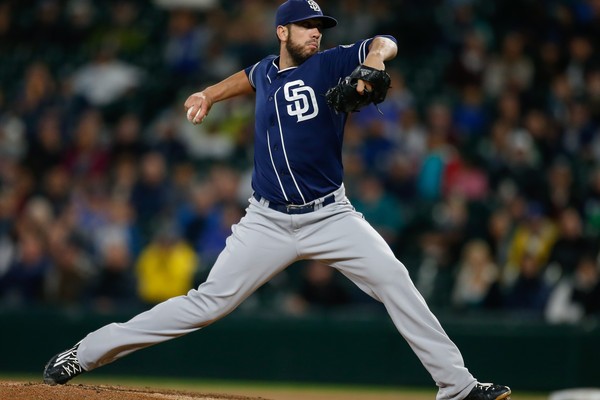I couldn’t be happier about my play for tonight. Everything is pointing me toward one pitcher. I’m not sure that I’ve ever liked someone this much (maybe excluding my wife). That pitcher: Max Scherzer.
For starters, he’s going against the . . . wait . . . I missed it? He threw last night? Oh well.
How’d he do?
This is On The Contrary, in which I aim to find a low-rostered chucker who can help you climb your tournament leaderboard.
A Look at Last Week
Last week, Chris Rusin was low-rostered, but he certainly didn’t help people climb the leaderboard (other than those who didn’t play him, I suppose). Rusin threw four-plus innings and struck out four batters while giving up seven earned runs.
Looking back, I tell myself that the research was solid — that if I stick with and perfect the process, the results will follow — but I might have been stretching a bit on the Rusin pick.
Moving Forward
Today we’ll look to get back on the winning track, where Jose Fernandez had us two weeks ago.
Thursday’s slate is different than what we’ve been seeing recently with the Coors games and whatnot. There is only one team projected at more than 4.6 runs (Baltimore, 5.4) and six teams in the 4.0-4.6 range. In other words, there aren’t a ton of pricey stacks to spend your salary on. That likely means that people will pay up for elite pitching options such as Clayton Kershaw ($12,500 on FanDuel, $13,300 on DraftKings), David Price ($9,400 FD, $11,000 DK), Vincent Velasquez ($9,100 FD, $10,900 DK), and Johnny Cueto ($10,300 FD, $10,400 DK).
If you noticed the title of the series, On The Contrary, I bet that you know where we’re going with this: James Shields.
Why Shields Will be Low-Owned
Especially at FanDuel (where wins are weighted heavily), DFSers don’t like to play underdog pitchers. They play favorites in the hopes of getting those 12 points at the end of the game.
In tournaments, I love playing small underdogs because they give us usable value. As a +126 underdog, San Diego has a 44 percent chance of winning the game. Of the DFSers who roster pitchers from games with similar moneylines, fewer than 44 percent take the underdog. (For more on usable value, see some book written by some guy named “Jonathan Bales.” Perhaps you’ve heard of him.)
DFSers will no doubt shy away from Shields because Milwaukee has the second-highest implied Vegas total on the board at 4.6 runs. I don’t particularly like the idea of Shields giving up a lot of runs, but strikeouts are more important anyway. They are the source of Upside — speaking of which, let’s shift the conversation.
Why I like Shields
Our K Predictor has Shields projected with the slate’s second-highest K mark (8.9), just behind Kershaw’s (11.0). Shields’ opponent, the Brewers, have a high strikeout rate of 30.35 percent. Against right-handed pitching specifically, they strike out the fourth-most among all MLB teams.
The Brewers are a top-10 team at hitting the fastball, but that’s only Shields’ fourth-best pitch and not one that he relies on often. He has more success with his cut fastball, curveball, and changeup, which is why I’m not too worried that his velocity has dropped by 0.8 miles per hour over the last 15 days, per our advanced stats.
Using our Trends tool, we can see that an MPH decrease between 0.5 and 1.0 hasn’t (historically) resulted in catastrophe when it’s coupled with a strikeout prediction between eight and 10. The count of 24 is low, but it’s tough to argue with a +10.34 Plus/Minus, which is nearly double the Plus/Minus for the average pitcher projected to get between eight and 10 strikeouts when recent MPH isn’t factored in.
For a finesse pitcher with a good chance of getting strikeouts, losing a bit off a fastball isn’t as bad as it would be for a hard thrower.
Other Tidbits
- Salary Change of -$800 in the last month: +0.35 Plus/Minus
- Bargain Rating of 68 percent on FanDuel: +0.24 Plus/Minus for pitchers between 60-75 percent
- Milwaukee’s wOBA (.288): Sixth-worst in the slate
- Slate’s third-highest groundball rate (61 percent) over his last two starts
- Third-highest-rated pitcher in the Player Model that I built to find contrarian options

